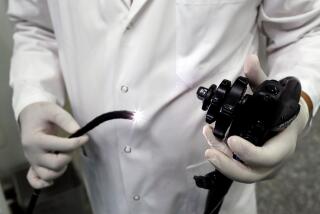Colorectal cancer screenings making a difference, CDC says
- Share via
Increased screening during the last decade for colorectal cancer, the nation’s second-leading cause of cancer deaths, has put a sharp dent in the prevalence of the disease and in the number of deaths resulting from it, the Centers for Disease Control and Prevention said Tuesday.
As screening for the disease among those ages 50 to 75 increased from half to two-thirds of that population, the prevalence rate fell from 52.3 cases per 100,000 in 2003 to 45.4 per 100,000 in 2007. The death rate fell from 19 per 100,000 to 16.7 per 100,000 during the same period, the agency reported in its Morbidity and Mortality Weekly Report.
Those declines represent 66,000 fewer cancers during the period and 32,000 fewer deaths, the agency found. But there are still 22 million Americans in that age group who are not being screened, the report says.
“That’s a remarkable increase in screening … but we are concerned that it is beginning to level off,” said Dr. Thomas R. Frieden, the CDC director.
The incidence of and deaths from colorectal cancer declined in 49 states — every one except Mississippi, where the rates remained stable. In California, the death rate during the period dropped an average of 2.2% per year, and the prevalence declined 1.9% annually. Nationwide, the death rate fell 3% per year and the prevalence dropped 3.4% per year.
In 2007, more than 142,000 people were diagnosed with colorectal cancer and more than 53,000 people died from it. “Most of those deaths could be prevented” if everyone in the 50-75 age group was screened, Frieden said.
Most agencies now recommend three types of routine screening for colorectal cancer. They are:
• A yearly home test for fecal occult blood; that is, blood that is hidden in the stool.
A flexible sigmoidoscopy by a healthcare provider every five years. In this procedure, a physician uses an endoscope to view the lower portion of the colon, known as the sigmoid colon.
A colonoscopy every 10 years. In a colonoscopy, the entire colon is examined.
The tests should be repeated more frequently for patients who have been found to have polyps or who have a family history of colorectal cancer.
Frieden urged physicians and nurses to step up their efforts to get patients into screening programs. “The largest single risk factor for not being screened” is the failure of a patient’s doctor to recommend it, he said.
Many patients also object to screening because the preparation, which involves flushing fecal matter out of the intestines the night before, can be unpleasant. “But the prep is a whole lot less unpleasant than getting cancer,” Frieden said.






